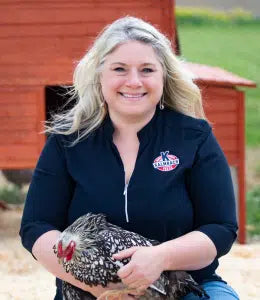Common Eggshell Defects – Cracks and Checks

Today, we are going to talk about a common eggshell defect, why it may happen, and how to prevent it, if we can.
Eggshell Cracks and Checks
Backyard poultry owners are familiar with broken eggshells. However, there are two distinct types of breaks in eggshells. A “crack” is the most common terminology, but a “check” is a more common occurrence! A check is when there is a break in the shell, but the shell membrane remains intact, and the contents of the egg remain inside the membrane. A crack is when the shell and the membranes break and the contents of the egg spill out of the shell. Most of us have picked up checked eggs and cleaned up cracked eggs a time or two in our poultry-keeping years. Why do these things happen?
Cracks and Checks – Why Do They Happen?
Clumsy Hens
There are a number of reasons that cracks and checks can happen. Our hens are usually the most common culprit! Nesting boxes with wooden or metal bottoms need a lot of cushion to prevent cracks and checks. As hens jostle for position in a favorite nesting box or jump into a nesting box after another hen has left an egg, she can accidentally (or intentionally – egg eating chickens!) damage eggshells in the process. Keeping a deep cushion of support under those eggs can help absorb some of that shock and prevent cracked and checked eggshells. You want to make sure to add soft, clean, and dry material to the bottom of your nesting boxes. There are a ton of very good options available for nesting boxes, but shavings, straw, hay, and astroturf are just a few good examples.
Nutrition
Over 90% of an eggshell is calcium carbonate. Making sure your birds have access to a high-quality chicken feed that contains the proper amount of calcium is essential to preventing cracks and checks. A good layer feed should have 3-4 times more calcium than a starter/grower or a maintenance feed. Supplements like oyster shells and limestone chips are also great sources of calcium and can be offered to your hens in a separate bowl or feeder.
It's also very important to remember that calcium is not the only essential component to eggshell quality. How calcium is absorbed and moves in a hen’s body depends on a number of other nutrients. Have you ever wondered why Vitamin D is added to milk? It’s because Vitamin D and calcium are dependent on each other to be digested and absorbed. There are many essential components that work together to make high quality eggshells. Choosing a high-quality, well-balanced chicken feed is the best way to help prevent checks and cracks in your eggs.
Age and Genetics
Age and genetics play a vital role in eggshell quality. Thin-shelled eggs are, of course, more likely to check or crack. Eggs from older hens are more likely to have thinner shells because olden hens often lay larger eggs. The amount of calcium in an eggshell stays surprisingly consistent no matter what size the egg. Therefore, hens that lay larger eggs cover more surface area with the same amount of calcium. The only way to cover more surface area with the same amount of “building material” is to use a thinner layer of building material. Thus, larger eggs often have thinner shells.
There is nothing you can do about the age of your hens. Older birds do usually lay larger eggs. However, making sure your birds have consistent access to high quality layer feed is vital to good eggshell quality. It’s also a good idea to evaluate the type of feed that you are using. Protein and egg size are directly related. More protein usually equals larger eggs. If your hens are giving you XL or jumbo eggs and you’re having problems with broken shells, check to see if you have any opportunity to reduce the amount of protein you are feeding. Shrinking that egg from a jumbo to a standard large size may strengthen your eggshells and help prevent checks and cracks.
Environmental Factors and Stress
Did you know that hens are far more likely to lay eggs with thin shells during hot weather or that eggs that freeze will expand and crack the shell? Environmental factors play a big role in the prevalence of checked and cracked eggs.
Stress can also affect how a hen lays eggs. If a hen is stressed during the calcification process, she can develop checks on her egg while it is forming. Amazingly, she can actually repair that crack before laying the egg. Since eggshell formation is the most time-consuming part of the egg making process (15 of the 23 hours), these repaired areas aren’t uncommon. Eggs may also have a mottled appearance with thin spots on the shell. Many of these factors are a result of stress. Just like people, some hens are more prone to the negative effects of stress. If you have any time of consistent stress (predator pressure, heat stress, dominant hens, an overzealous rooster, etc.) or you have a particularly flighty hen, you are more likely to notice these repairs.
Remember, providing access to a high-quality, well-balanced chicken feed is the best way to ensure great eggshell quality from your hens. If you need help picking the right feed for your flock, contact us. We are always happy to help!
Keeping poultry is such a wonderful experience and the rewards are many! At Kalmbach Feeds®, we are always here to help. If you have any questions about the nutrient needs of your birds, feed options, or general poultry keeping, please let us know. We are so excited to continue writing about all of the topics that are important to you and can’t wait to continue learning about your flocks. Stay tuned and thank you for choosing Kalmbach Feeds®!
